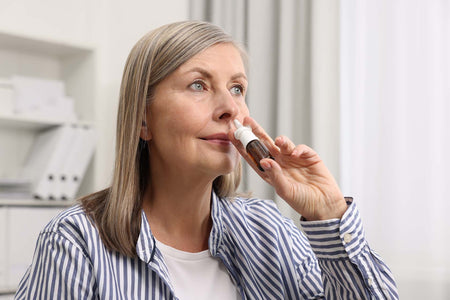- Benadryl is effective for fast relief of allergy symptoms but can cause drowsiness, which makes it a better choice for nighttime use or when you don't need to stay alert.
- Claritin provides 24-hour relief without causing drowsiness. It’s ideal for daytime use when you need to stay focused and active throughout the day.
- Allermi’s Super Spray is a more comprehensive solution as it combines multiple active ingredients like antihistamines, decongestants, and anti-inflammatory agents.
When allergy symptoms strike, reaching for an over-the-counter (OTC) antihistamine is often the first step toward relief. But with so many options available, knowing which one to choose can be tough.
If you find yourself debating between Benadryl and Claritin — two of the most well-known antihistamine brands — you might wonder which is better for your symptoms or less likely to leave you feeling drowsy.
Knowing how these medications differ can help you choose the right one, and learning about other treatments might give you more ways to handle your allergies.
Related: What to Do When Allergy Medicine Doesn't Work?
What is Benadryl?
Benadryl is a popular over-the-counter medication used to treat allergy symptoms like itching, watery eyes, and sneezing. Its active ingredient is diphenhydramine, a first-generation antihistamine. Diphenhydramine blocks histamine, a chemical in your body that triggers allergy symptoms [*].
In addition to allergies, Benadryl is also used to relieve runny nose and sneezing caused by the common cold, which sets it apart from some other antihistamines.
One of the well-known side effects of Benadryl is drowsiness. This happens because it crosses the blood-brain barrier and affects the central nervous system. Benadryl's active ingredient, diphenhydramine, blocks histamine receptors in the brain, which are responsible for promoting wakefulness and alertness.
As a result, this blockage can make you feel sleepy or sluggish shortly after taking the medication. This sedative effect is why Benadryl is sometimes used as a sleep aid.
Benadryl comes in different forms, including tablets, liquids, and creams, and there are versions specially formulated for children to make dosing easier and safer.
Related: Zyrtec vs. Benadryl: Differences and Alternatives
What is Claritin?
Unlike Benadryl, Claritin is classified as a non-drowsy antihistamine, meaning it does not cross into the brain to the same extent and is less likely to cause sleepiness [*]. This feature is significant for people who need allergy relief without feeling tired, which allows them to go about their day without interruption.
Its active ingredient is loratadine, which works by blocking histamine, the chemical responsible for allergy symptoms. Another reason Claritin stands out is that it provides 24-hour relief with a single dose. This makes it convenient for people who want long-lasting symptom management without frequent dosing.
Claritin is available in various forms, including tablets, liquid, and chewables, with options especially designed for children, to ensure effective and safe use for all age groups.
Related: Zyrtec vs. Claritin: Differences and Alternatives
Benadryl vs. Claritin
While Benadryl and Claritin are antihistamines, they differ in how they work, how long they last, and the side effects they may cause.
To simplify this comparison, the table below highlights key information, including their indications, side effects, onset of action, duration, potential drug interactions, and important warnings or precautions.
| Benadryl | Claritin | |
| Drug Class | Antihistamine (First-generation), often causes drowsiness | Antihistamine (Second-generation), less sedating |
| Generic Name | Diphenhydramine | Loratadine |
| Indications | This medication provides relief for a variety of allergy symptoms, including sneezing, runny nose, itchy or watery eyes, and throat or nose irritation. It also treats hives, itching, and other mild allergic skin reactions. In addition, it alleviates cold symptoms like runny nose and sneezing, offers temporary relief from motion sickness, and can be used as a nighttime sleep aid. Furthermore, it is effective for treating mild reactions to insect bites or stings. | This medication offers relief from seasonal allergic rhinitis (hay fever) symptoms, including sneezing, runny nose, itchy or watery eyes, and itchy throat. It also provides relief from chronic urticaria (hives) and the associated itching, as well as helping to manage perennial (year-round) allergies, ensuring comfort for individuals affected by various allergic conditions. |
| Side Effects | Common side effects of Benadryl include drowsiness, dizziness, dry mouth, nose, or throat, as well as blurred vision, constipation, and difficulty urinating. Some individuals, particularly older adults, may experience confusion or nausea. Although rare, serious side effects can occur, such as allergic reactions like rash, itching, or swelling, along with rapid heartbeat and increased eye pressure, which can be particularly concerning for those with glaucoma. | Nausea can occur, but it is generally rare. Serious side effects are uncommon but may include allergic reactions such as rash, itching, or swelling, as well as dizziness or lightheadedness. In very rare instances, Claritin may cause liver problems, especially in individuals with pre-existing liver conditions. |
| Duration/Course | 4 to 6 hours | Symptom relief for a full 24 hours |
| Onset | 15 to 30 minutes | Most people will start to feel relief from their allergy symptoms within 3 hours |
| Dosage | Benadryl dosage varies by age and condition, so it's important to follow guidelines and consult a healthcare provider or pharmacist, especially for children or extended use. | Claritin is usually taken as one tablet per day for adults, but it's best to check with a healthcare provider or pharmacist if you have health conditions or take other medications. |
| Drug Interaction | Benadryl can interact with other medications, particularly those that cause drowsiness, such as alcohol, sedatives, or tranquilizers. Combining Benadryl with these substances can intensify the sedative effects, leading to excessive drowsiness, dizziness, and difficulty concentrating. In some cases, this interaction can be dangerous, especially for older adults. | Claritin can interact with certain medications, particularly those that affect the liver enzyme CYP3A4, which is involved in breaking down loratadine. For example, ketoconazole (an antifungal) and certain antibiotics like erythromycin can increase the levels of loratadine in the blood, which may cause side effects like dizziness or Claritin can interact with certain medications, especially those that affect the liver enzyme CYP3A4, which plays a role in breaking down loratadine. For instance, ketoconazole (an antifungal) and certain antibiotics like erythromycin can raise loratadine levels in the blood, potentially causing side effects such as dizziness or drowsiness. Additionally, it’s important to avoid combining Claritin with other antihistamines or medications that cause sedation. |
| Warnings/Precautions | Benadryl can cause significant drowsiness, impairing your ability to perform tasks requiring full alertness, such as driving. It's important to avoid alcohol while using Benadryl, as it can enhance drowsiness and increase the risk of side effects. Use with caution in older adults, as they may be more susceptible to confusion, dizziness, and falls. Additionally, Benadryl should only be used during pregnancy if clearly needed, as it can pass into breast milk and may cause drowsiness in nursing infants. | Use Claritin with caution in individuals with liver problems, as it is metabolized in the liver and impaired liver function can increase the medication’s effects. While Claritin is generally considered safe during pregnancy and breastfeeding, it's always advisable to consult a healthcare provider before use. Although Claritin is less likely to cause drowsiness, it’s still best to avoid alcohol, as it may increase the risk of side effects or reduce the medication’s effectiveness. |
What’s the Best Alternative to Benadryl vs. Claritin?
Some people may look for an alternative to Benadryl or Claritin due to concerns about side effects, such as drowsiness with Benadryl or the need for a more comprehensive solution than what Claritin offers. Allermi's Super Spray is an excellent alternative.
Allermi combines 3-4 active ingredients (antihistamine, micro-dosed decongestant, anti-inflammatory, and anti-discharge) to help control allergy symptoms. The spray form is important because it targets the symptoms directly and works quickly. It’s a convenient and helpful option for those who want an alternative to regular oral antihistamines.
Unlike regular nasal sprays, which remain the same, Allermi can be tailored to fit your needs. Depending on how you respond to your first formula or how your symptoms change with the seasons, your formula can be modified by increasing or decreasing the percentages or adding or removing medications.
If your symptoms are seasonal, you might use it twice a day during peak allergy seasons, then stop when the season ends and you no longer have triggers.
Related: How Long Does It Take for Allergy Medicine to Work?
The Bottom Line
Benadryl works quickly but may cause drowsiness, while Claritin provides a non-drowsy option with 24-hour relief. If you’re looking for alternatives, Allermi's Super Spray is a versatile, fast-acting solution that can be adjusted based on your symptoms.
There are many options for allergy relief, so it’s important to choose one that works best for your needs and lifestyle.
References:
- Sicari, V., & Zabbo, C. P. (2023, July 10). Diphenhydramine. StatPearls - NCBI Bookshelf. https://www.ncbi.nlm.nih.gov/books/NBK526010/
- Church, M., & Church, D. (2013). Pharmacology of antihistamines. Indian Journal of Dermatology, 58(3), 219. https://doi.org/10.4103/0019-5154.110832










